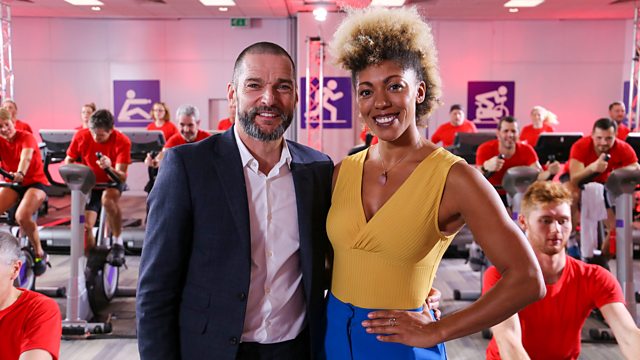BBC’s ‘appalling’ new restaurant show slammed for triggering people with eating disorders, which disproportionately affect the LGBT+ community

The show is hosted by First Dates maitre d’ Fred Sirieix and Dr Zoe Williams, an actual practising NHS GP. (BBC)
The Restaurant That Burns Calories has been slammed for promoting unhealthy relationships with food and triggering those with eating disorders, which disproportionately affect the LGBT+ community.
Caution: This article contains discussion of eating disorders, but there will be no numbers mentioned.
The new BBC show features a restaurant which brings in “unsuspecting” diners to enjoy a meal, but there’s a horrific twist. In the same building is a gym, where “fitness fanatics” exercise to “burn off” the exact number of calories consumed by people in the restaurant.
The BBC described the 18-episode series as a “groundbreaking stunt for science strand Horizon” and said it was based on “the latest scientific research”. It is hosted by First Dates maitre d’ Fred Sirieix and Dr Zoe Williams, an actual practising NHS GP.
But the show has been slammed by charities, celebrities and medical professionals for promoting dangerous and unhealthy attitudes towards food, especially during a time when more people are likely to be experiencing poor mental health.
Calls to eating disorder helpline triple after The Restaurant That Burns Calories.
Critics say The Restaurant That Burns Calories does not just negatively affect those diagnosed with eating disorders, it adds to the increasing fatphobia associated with social distancing, as people franticly work out in their living rooms to assuage the fear of quarantine weight-gain.
The UK’s eating disorder charity Beat took to social media as soon as the programme aired on Monday (April 20) to discourage people from watching. The organisation even extended the hours of its helpline by three hours to help those affected by the show.
The charity later revealed that it had received three times more calls than normal during the fallout after the show.
https://twitter.com/beatED/status/1252351241813807107
Beat’s director of services, Caroline Price, told PinkNews in a statement: “We know that the myth that all calories eaten must be cancelled out through exercise has the potential to be devastating to those suffering from or vulnerable to eating disorders.
“Being told how much activity it would take to burn off particular foods risks triggering the illness further, and we strongly advise against anyone at risk to avoid these sources of information.
“We would urge television commissioners to consider the impact that their programmes may have on vulnerable people, and instead focus on healthy and balanced eating.”
Food writer Ruby Tandoh urges: “You don’t have to earn your food.”
Food writer and former Great British Bake Off contestant Ruby Tandoh, who has struggled with an eating disorder herself, wrote an article on Medium about the show, titled: “You don’t have to earn your food.”
She wrote: “I should not have to explain that directly equating food eaten with an exercise ‘equivalent’ can serve as a bulimia ‘how-to’.
“I should not have to go against the moral of a show commissioned and aired by our national broadcaster when I say that positioning health as an individual ‘choice’ could be harmful, even lethal, for those with eating disorders.
“I shouldn’t have to point out that positing food as something to be ‘earned’ will only compound the guilt and self-blame of those who struggle with binge eating.
“It shouldn’t be on me — a person who struggled with disordered eating for many years, and continues to live with its echo — to insist that programming doesn’t entrench precisely the kind of obsessive, unhappy, self-castigating mindsets that eating disorder therapists, clinics and patients work for years to overcome.
“Some do not manage to move beyond their eating disorder: they live in flux, swinging between struggle and submission, never quite making peace with their appetite. As a result of these patterns of thinking and behaviour, some people even die.”
https://twitter.com/rubytandoh/status/1252271945451798540
Tandoh, who is bisexual, was sure however to remind those struggling of a fact which could be easily forgotten at the moment: “A calorie is no measure of the world… It is just the energy needed to raise the temperature of one gram of water by 1°C. Nothing more, nothing less.”
LGBT+ people are disproportionately affected by eating disorders.
LGBT+ people are disproportionately affected by eating disorders, as well as other by other mental health problems including anxiety, depression and suicidal thoughts.
A 2018 study by some of the top US eating disorder centres revealed that LGBT+ teens are eleven times more likely to develop an eating disorder such as binge eating disorder, anorexia, bulimia, or an other specified feeding or eating disorder (OSFED).
As part of the exclusive documentary Coming Out Twice: Eating Disorders in the LGBT+ Community, PinkNews found last year that more than 100,000 gay or bisexual men could be living with an eating disorder in the UK.
If you have been affected by The Restaurant That Burns Off Calories or the issues discussed in this article, contact the Beat adult helpline on 0808 801 0677, or the Beat youthline on 0808 801 0711.
In the US, the National Eating Disorders Association (NEDA) helpline can be contacted on (800) 931-2237.

